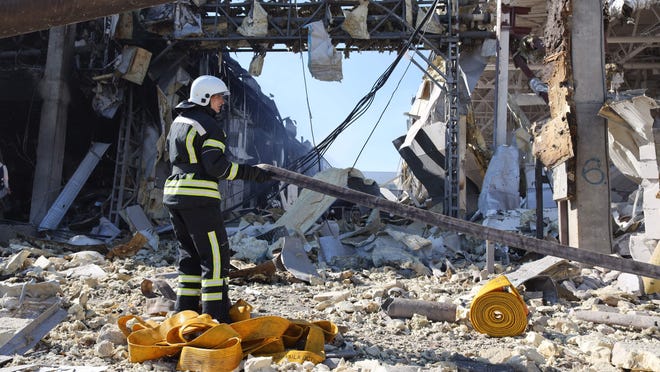
The United States has sent tens of billions of dollars in aid to Ukraine, some of it in military assistance. On Saturday, President Joe Biden signed a $40 billion aid package that included more than $20 billion for the Pentagon to provide weapons, intelligence, and training to Ukraine.
But the U.S. has refrained from sending American troops to the war-torn country. Bringing American forces back to Ukraine would require “presidential decisions,” Defense Secretary Lloyd Austin said Monday at a press conference.
“I think this is Ukraine's fight,” Austin said. “It's not the United States' fight. We are doing everything that we can to make sure that we are supporting them in their effort to defend their sovereign territory.”
Meanwhile, Biden told fellow Indo-Pacific leaders assembled for a four-country summit Tuesday that they were navigating "a dark hour in our shared history" due to Russia’s brutal war on Ukraine and he urged the group to make a greater effort to stop Vladimir Putin’s aggression.
"This is more than just a European issue. It’s a global issue," Biden said as the “Quad” summit with Japan, Australia and India got underway. While he did not directly call out any countries, Biden's message appeared to be pointed, at least in part, at Indian Prime Minister Narendra Modi, with whom differences persist over how to respond to the Russian invasion.
USA TODAY ON TELEGRAM:Join our Russia-Ukraine war channel to receive updates straight to your phone
Latest developments:
►Vladimir Saldo, installed by Russia as governor of Ukraine’s southern Kherson region, said the area will have dual currency — Russian rubles and Ukrainian hryvnyas — starting Monday.
►A veteran Russian diplomat to the U.N. Office at Geneva resigned his post Monday, saying he is "ashamed" of his country's invasion of Ukraine.
US, Britain accuse Russia of cyberattacks, spreading disinformation
The United States and Britain accused Russia of manipulating public opinion and spreading disinformation about the war in Ukraine by conducting cyberattacks and censoring content.
Britain’s deputy ambassador James Roscoe said to a U.N. Security Council that Russia used cyberattacks and “an online troll factory to spread disinformation and manipulate public opinion about their war.”
U.S. Ambassador Linda Thomas-Greenfield said the Russian government “continues to shut down, restrict and degrade internet connectivity, censor content, spread disinformation online, and intimidate and arrest journalists for reporting the truth about its invasion.”
Russia has passed strong censorship laws, threatening individuals with up to 15 years of prison for publishing information that runs counter to Russia's narrative about the invasion.
Contributing: The Associated Press
Source link









